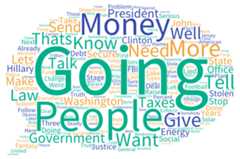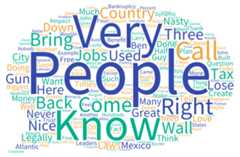 Ballotpedia'sscope changes periodically, and this article type is no longer actively created or maintained. If you would like to help our coverage grow, considerdonating to Ballotpedia.
Ballotpedia'sscope changes periodically, and this article type is no longer actively created or maintained. If you would like to help our coverage grow, considerdonating to Ballotpedia.
See also:Boulder, Colorado CNBC Republican debate (October 28, 2015)- 2020 Candidates
- 2016 Pres. Election
- Analysis
- Media narratives
- Post-debate analysis
- Democrats
- Republicans
- March 10, 2016 (CNN)
- March 3, 2016 (FNC)
- February 25, 2016 (CNN)
- February 13, 2016 (CBS)
- February 6, 2016 (ABC)
- January 28, 2016 (FNC)
- January 14, 2016 (FBN)
- December 15, 2015 (CNN)
- November 10, 2015 (FBN)
- October 28, 2015 (CNBC)
- September 16, 2015 (CNN)
- Insiders Polls
- Post-debate commentary
- Issues
- Power Players
- Polls
- Conventions & delegates
This article analyzes the central themes of the Republican presidential debate held on October 28, 2015, inBoulder, Colorado. The transcript prepared byThe Washington Post was used to measure candidate participation and audience engagement.[1]Footage from the debate was consulted where there were ambiguities in the text.
To compare the statistics of this debate to the previous Republican debate, please seethe analysis of topics and participation in the September 2015 CNN Republican debate.
Segments
The third Republican presidential debate featured 32 unique discussion segments covering a range of economic and regulatory issues. These discussion segments were measured by any shift in the theme of a discussion prompted by one of the moderators: John Harwood,Becky Quick and Carl Quintanilla. Panelists Jim Cramer, Sharon Epperson and Rick Santelli also posed questions to the candidates.
Although the formal title of CNBC's debate was "Your Money, Your Vote," a significant number of the discussion segments – 10 out of 32 – questioned a candidate's character, professional history or personal finances.[2] Three separate discussion segments were initiated with a question related toDonald Trump's candidacy. WhenMike Huckabee was asked to comment on Trump's moral authority, he said, "You know, of the few questions I've got, the last one I need is to give [Trump] some more time."[1]
Overall participation
Participation in a segment was defined by a substantive comment related to the segment's topic. Jokes and attempts to gain permission from a moderator to speak were not considered participatory speech acts. In some instances, candidates who participated in a segment diverted from the prompted topic.
Each candidate participated in six to nine discussion segments. The CNBC moderators frequently introduced a discussion segment but only asked one candidate for his or her opinion on the subject. More than half of the discussion segments involved only one candidate. Excluding the opening question and closing statements, the discussion segment on reforming federal assistance programs involved the greatest number of candidates with eight participating. The discussion segment on how to address income inequality through tax policies followed with five participants.
Candidate participation by behavior
Participation in the debate was also measured by the candidate's behavior at the start of each discussion segment. This study considered whether a candidate was initially prompted to speak during a discussion segment by a moderator or whether he or she independently engaged in the discussion segment by interrupting another candidate or calling on the moderator for permission to speak. A candidate's conduct after they joined a discussion segment was not considered.
Compared to theDemocratic presidential debate held on October 28, 2015, the Republican candidates were more aggressive in interrupting their fellow candidates or the moderators in an attempt to join a discussion segment for the first time. As in theprevious Republican presidential debate on CNN,Carly Fiorina interrupted the most with four interjections.Jeb Bush andJohn Kasich followed with the three interjections.Donald Trump,Ben Carson andMike Huckabee only substantively participated in a discussion segment when called on by a moderator.
Candidate participation by speaking time
NPR,Politico andThe New York Times all reported on the number of minutes each candidate spoke.[3][4][5] These totals varied up to one minute between each organization's measure of candidate speaking time. According toThe New York Times andPolitico,Jeb Bush talked for approximately six minutes, less than any other candidate. This is a significant change from theprevious Republican debate where Bush spoke longer than every candidate butDonald Trump.
Candidate participation by segment vs. speaking time
The amount of time a candidate spoke did not necessarily align with the number of issues he or she covered during the debate. For example, Bush engaged in the most discussion segments even though he spoke the least byNPR andThe New York Times' measures.
Audience engagement
Audience engagement was measured by noting the instances of applause, cheering or laughter inThe Washington Post's transcript. Footage from the debate was consulted where it was ambiguous in the text who the audience was responding to. Multiple expressions of positive audience engagement during one speech act were marked as a single instance of audience engagement. Huckabee, Rubio and Trump received the warmest response from the crowd, while Bush, Kasich and Paul failed to resonate with the live audience.
Although Carson had a comparatively moderate response, he was the only candidate to receive support from the live audience against a moderator's line of questioning. WhenCarlos Quintanilla questioned Carson's judgment relating to his business relationship with the nutritional supplement company Mannatech, the audience booed him.
Candidate speech analysis
 Word cloud of Jeb Bush's speech during the debate | - Candidate:Jeb Bush
- Speaking time: 6.7 min
- Number of words: 1,502
- Most commonly used words:
- People: 14
- Tax: 11
- Need: 11
- Country: 10
- Spending: 8
|
|
 Word cloud of Ben Carson's speech during the debate | - Candidate:Ben Carson
- Speaking time: 7 min
- Number of words: 1,376
- Most commonly used words:
- People: 19
- Tax: 11
- Percent: 10
- Well: 9
- Government: 8
|
|
 Word cloud of Chris Christie's speech during the debate | - Candidate:Chris Christie
- Speaking time: 8.5 min
- Number of words: 1,630
- Most commonly used words:
- Going: 13
- People: 11
- Money: 10
- More: 10
- Know: 9
|
|
 Word cloud of Ted Cruz's speech during the debate | - Candidate:Ted Cruz
- Speaking time: 7.6 min
- Number of words: 1,214
- Most commonly used words:
- Question: 10
- Know: 9
- People: 9
- Want: 8
- Look: 8
|
|
 Word cloud of Carly Fiorina's speech during the debate | - Candidate:Carly Fiorina
- Speaking time: 10.5 min
- Number of words: 1,785
- Most commonly used words:
- Government: 24
- Power: 13
- Talk: 12
- Know: 11
- Business: 10
|
|
 Word cloud of Mike Huckabee's speech during the debate | - Candidate:Mike Huckabee
- Speaking time: 7.7 min
- Number of words: 1,467
- Most commonly used words:
- People: 18
- Government: 15
- Know: 10
- Country: 9
- Well: 8
|
|
 Word cloud of John Kasich's speech during the debate | - Candidate:John Kasich
- Speaking time: 9.7 min
- Number of words: 1,860
- Most commonly used words:
- Need: 13
- Job: 12
- Country: 12
- Know: 12
- People: 11
|
|
 Word cloud of Rand Paul's speech during the debate | - Candidate:Rand Paul
- Speaking time: 6.3 min
- Number of words: 1,225
- Most commonly used words:
- Money: 12
- Govern: 11
- Think: 11
- Tax: 11
- Fed: 9
|
|
 Word cloud of Marco Rubio's speech during the debate | - Candidate:Marco Rubio
- Speaking time: 10.2 min
- Number of words: 2,481
- Most commonly used words:
- People: 19
- American: 14
- More: 13
- Work: 12
- Tax: 12
|
|
 Word cloud of Donald Trump's speech during the debate | - Candidate:Donald Trump
- Speaking time: 9.4 min
- Number of words: 1,794
- Most commonly used words:
- People: 18
- Know: 15
- Very: 14
- Right: 12
- Country: 12
|
|
See also
Footnotes
- ↑1.01.1The Washington Post, "The third Republican debate transcript, annotated," October 28, 2015
- ↑CNBC, "'Your Money, Your Vote: The Republican Presidential Debate' on Wednesday October 28," September 30, 2015
- ↑Twitter, "NPR Politics," October 28, 2015
- ↑The New York Times, "Republican Debate on Economic Issues: Analysis," accessed October 29, 2015
- ↑Politico, "Debate: By the numbers," October 28, 2015
| 2016 United States Presidential Election |
|---|
| | Overviews | |  | | | Candidate profiles | | | | Path to the presidency | | | | Policy positions | | | | On the campaign trail | | | | Campaign staff | | | | Debates |  PBS, February 11, 2016 (Milwaukee) PBS, February 11, 2016 (Milwaukee) • PBS, February 4, 2016 (Durham, N.H.) • NBC News, January 17, 2016 (Charleston, S.C.) • ABC, December 19, 2015 (Manchester, N.H.) • CBS, November 14, 2015 (Des Moines) • CNN, October 13, 2015](Las Vegas)
 February 13, 2016 (Greenville, S.C.) February 13, 2016 (Greenville, S.C.) • ABC, February 6, 2016 (Manchester, N.H.) • Fox News, January 28, 2016 (Des Moines) • Fox Business, January 14, 2016 (North Charleston, S.C.) • CNN, December 15, 2015 (Las Vegas) • Fox Business, November 10, 2015 (Milwaukee) • CNBC, October 28, 2015 (Boulder) • CNN, September 16, 2015 (Reagan Library) • Fox News, August 6, 2015 (Cleveland) | | | Analysis | The media's coverage of Donald Trump • The media's coverage of Hillary ClintonPost-debate analysis overview
Democratic:April 14, 2016 (CNN) •March 9, 2016 (Univision) •March 6, 2016 (CNN) •February 11, 2016 (PBS) •February 4, 2016 (MSNBC) •January 17, 2016 (NBC) •December 19, 2015 (ABC) •November 14, 2015 (CBS) •October 13, 2015 (CNN)
Republican:March 10, 2016 (CNN) •March 3, 2016 (FNC) •February 25, 2016 (CNN) •February 13, 2016 (CBS) •February 6, 2016 (ABC) •January 28, 2016 (FNC) •January 14, 2016 (FBN) •December 15, 2015 (CNN) •November 10, 2015 (FBN) •October 28, 2015 (CNBC) •September 16, 2015 (CNN)
Insiders Poll: First Democratic debate (October 13, 2015) • Presidential Nominating Index: Clinton remains choice of Democratic Insiders • Presidential Nominating Index: Bush remains choice of Republican Insiders • Insiders Poll: Winners and losers from the Fox News Republican Debate |
|
Editorial Content
Josh Altic, Director of Content •
Daniel Anderson, Associate Director of Elections & Data •
Cory Eucalitto, Associate Director of Features •
Ryan Byrne, Managing Editor of Ballot Measures •
Mandy McConnell, Managing Editor of News •
Doug Kronaizl, Managing Editor of Local Expansion •
Abbey Smith, Managing Editor of Elections •
Janie Valentine, Managing Editor of Law •
Joel Williams, Managing Editor of Events •
Andrew Bahl •
Jaclyn Beran •
Marielle Bricker •
Joseph Brusgard •
Emma Burlingame •
Kelly Coyle •
Jon Dunn •
Victoria Edwards •
Thomas Ellis •
Nicole Fisher •
Joseph Greaney •
Thomas Grobben •
Brianna Hosea •
Molly Kehoe •
Tyler King •
Glorie Martinez •
Norm Leahy, Senior Editor •
Nathan Maxwell •
Jimmy McAllister •
Brandon McCauley •
Ellie Mikus •
Ellen Morrissey •
Mackenzie Murphy •
Kaley Platek •
Samantha Post •
Adam Powell •
Annelise Reinwald •
Ethan Rice •
Spencer Richardson •
Victoria Rose •
Briana Ryan •
Myj Saintyl •
Maddy Salucka •
Emma Soukup •
Alexis Thacker •
Mina Vogel •
Samuel Wonacott •
Trenton Woodcox
 Ballotpedia'sscope changes periodically, and this article type is no longer actively created or maintained. If you would like to help our coverage grow, considerdonating to Ballotpedia.
Ballotpedia'sscope changes periodically, and this article type is no longer actively created or maintained. If you would like to help our coverage grow, considerdonating to Ballotpedia.

























